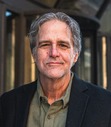David Hicks's Blog
September 13, 2025
“ArtScene” Interview with David Hicks on WVIA, Northeast PA affiliate of NPR
Following her dramatic reading of Chapter 11 of THE GOSPEL ACCORDING TO DANNY, ArtScene host Erika Funke asks David about the themes and methods behind his latest novel, in particular his balance of the personal and political missions of the book. Listen to it here.
The post “ArtScene” Interview with David Hicks on WVIA, Northeast PA affiliate of NPR appeared first on David Hicks | Author.
June 9, 2025
David Hicks on Writing that is “Wrought”
David was recently interviewed by author Tess Callahan for her substack, “Writers at the Well.” Read it here.
Here’s an excerpt:
What would you like readers to know about The Gospel According to Danny that might not be obvious from the jacket copy?That even though it’s a pretty devastating book, it’s also a love story, written with tenderness and humor. Not a typical love story between the main characters, perhaps, but certainly between Danny and his daughters, between Lia and Terrence, and, in a manner of speaking, between Danny and himself.There are no villains here, in other words. (Lia may seem like one at first glance, but she isn’t. She’s doing what she can to make things work.) Almost every difficult thing that happens in the book may be attributed to Danny’s lack of love for himself—and his recognition of that, by way of the landscape, brings him, and us, hope. 
The post David Hicks on Writing that is “Wrought” appeared first on David Hicks - Author.
March 24, 2025
Writing Through Difficulty
I know, the expression is “practice makes perfect,” but there is no perfect when it comes to writing. There is only, “As close to perfect as I can make it.”
You write, you revise again and again (for years!), and then when you give a reading of it you still think of how you could improve it.
But I do know this: practice does make proud. Especially when it’s something that feels impossible to pull off.
I recently spoke with my writing buddy Sophfronia Scott about how good I feel about my new novel, THE GOSPEL ACCORDING TO DANNY, and we shared our thoughts about where our pride in our work comes from:
(a) writing what we feel compelled to write (not what we think we should write in order to get published);
(b) feeling that we’re getting better with each book; and
(c) the years of drafting and revision–the years of hard and persistent work, in other words–that go into the final product.
Since then, I’ve read an op-ed by David Brooks in the New York Times about Haruki Murakami, Albert Einstein, and others who thrived and were at their happiest when they took on difficult tasks they’d never done before (running a marathon, writing a novel, figuring out the invisible forces of the universe). All were motivated by what Brooks calls “a moment of ignition,” when they were seized with curiosity or desire to do something, and then derived satisfaction from taking on such a great challenge, from failing and overcoming failure, from persistence in the face of difficulty.
This rings true. I am pleased when I do something that I already do well, or that I’m good at; but it doesn’t make me happy in the long term. However, when I take on something difficult that I’m really interested in, maddeningly curious about, or afraid to attempt, then yes, I may suffer, or silently whine or protest that I have to do it; but all along, I am secretly happy to be engaged in that difficult endeavor, not just if/when I finish it, but during the arduous process itself.
Because it’s difficult, in other words. And because it’s something I’m really interested in to begin with.
When I played in a rock band, I used to relish the experience, even though I was nervous about playing well–I had picked up an instrument (the saxophone) after not playing it for twenty-five years, and I’d never been “a natural”–but that made it all the more satisfying to re-learn how to play it, to practice with my friends, and then–the ultimate happiness–to play a gig in front of a live audience.
So it is with writing. I’m not happy only when my book is published; I truly enjoy the process of composing, revising, and revising some more. I like the difficulty of it. The work of it. The challenge of knowing I don’t have it right yet but if I keep trying, I’ll get it.
And that was especially true of my new novel, THE GOSPEL ACCORDING TO DANNY. Ten years ago I had a big idea–to try to depict the divisiveness in our country that has always been there, but which started to accelerate and magnify with the Columbine Massacre and the Bush/Gore Election debacle and worsened over the next two decades–but how to tell that story through the life of an individual character, a kind of American Everyman, without telegraphing the political agenda or turning my character into a mere vehicle for my ideas? The first draft, which sought to balance newspaper clippings, text messages, and blog posts with a non-linear narration, was a remarkable failure, but I kept at it, focusing more and more on the main character and gouging from it anything that might be considered unessential (I cut 60,000 words from first draft to last), until it finally felt right.
All along, I never felt exasperated or frustrated. Instead, I couldn’t wait to get back to it. To hack away at it, improving its focus and eliminating redundancies, until it felt “just right.”
And by that I mean “just right” to me, as well as to my trusted beta readers. Not “just right” for what I may have heard “the market” wants.
I know of several writers who have written books “for the market,” and I’ve attended readings featuring those books. It’s not pretty. The authors read from their books the way a wedding band plays “Shout” or “The Chicken Dance”–a stark difference from when the band plays their own songs, or when the writer reads from a work they wrote for themselves.
In contrast, I know many writers like Sophfronia, who labor for years on a book to get it right, and then persist in their efforts to get it published. When they read from their books, they glow.
Those are the kinds of books I want to read. As Toni Morrison (one of my literary heroes) once said, “If there’s a book that you want to read, but it hasn’t been written yet, then you must write it.”
So that’s what I’m going for–writing books I can be proud of, books that I would want to read, even they aren’t isn’t simple enough or “light” enough to be a “page turner” or a “summer read” that will become best-sellers and earn stellar reviews.
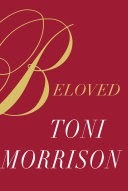 Cases in point: Two of my all-time favorite novels, Morrison’s Beloved and Nicole Krauss’s The History of Love, have earned reviews averaging
Cases in point: Two of my all-time favorite novels, Morrison’s Beloved and Nicole Krauss’s The History of Love, have earned reviews averaging 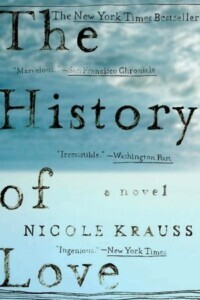 3.7 and 3.9 stars (out of 5), respectively, on Goodreads, largely because readers find them “too complicated.” My goodness. These are two of the best books I’ve ever read. Not just good but great. I get it; some people don’t want to work too hard when they read. I have one of those books on my nightstand right now, and I’m thoroughly enjoying it. But let’s not trash a more complicated book because it’s a little beyond our understanding, or because they challenge us a bit. Some of the readers who have given books like Morrison’s and Krauss’s just one or two stars seem angry that the author didn’t make things easy for them–as if they were personally offended. But I admire those books, because they are steeped in complexity, in terms of both character and structure. In other words, the authors took on very difficult, almost impossible, tasks, put in years of work, and managed to produce gorgeous books. They took on a challenge, and succeeded.
3.7 and 3.9 stars (out of 5), respectively, on Goodreads, largely because readers find them “too complicated.” My goodness. These are two of the best books I’ve ever read. Not just good but great. I get it; some people don’t want to work too hard when they read. I have one of those books on my nightstand right now, and I’m thoroughly enjoying it. But let’s not trash a more complicated book because it’s a little beyond our understanding, or because they challenge us a bit. Some of the readers who have given books like Morrison’s and Krauss’s just one or two stars seem angry that the author didn’t make things easy for them–as if they were personally offended. But I admire those books, because they are steeped in complexity, in terms of both character and structure. In other words, the authors took on very difficult, almost impossible, tasks, put in years of work, and managed to produce gorgeous books. They took on a challenge, and succeeded.
THE GOSPEL ACCORDING TO DANNY is fairly complex, and to be honest it’s kind of brutal (the main character gets hit with one personal disaster after another), so I’m guessing it will piss off some readers: there are no clear good guys or bad guys; no easy answers to the questions and perplexities involved; no simple resolutions to the internal and external conflicts it depicts. But that’s really okay. I’d rather be criticized for my best effort at writing something difficult than be praised for something into which I didn’t put much effort, or that I wrote “for the market.” (For the record, I would have no problem writing something easy, either! It’s just that I want to write what I want to write, not what I think people expect me to write.)
For what it’s worth, I would encourage you to take the same approach. What is it that you’re afraid to do? What are you avoiding because it might be too difficult? I would say, do that. It’ll be worth it; I promise.
Meanwhile, I’m in the midst of revising my third novel, which is, in its current state, kind of a mess. (I’m writing about something I’ve been avoiding for decades.) But I’m turned on by the process–I’m enjoying the challenge of not quite knowing what I’m doing or where it’s going.
How about you? What are you afraid to write about? What’s the challenge you’d like to take on?

The post Writing Through Difficulty appeared first on David Hicks - Author.
Practice Makes Proud
I know, the expression is “practice makes perfect,” but there is no perfect when it comes to writing. There is only, “As close to perfect as I can make it.”
I was talking to my writing buddy Sophfronia Scott this morning about how proud I am of my new novel, THE GOSPEL ACCORDING TO DANNY. So proud that I actually videotaped myself opening a box of Advanced Reader Copies that came in the mail, even though I felt a little silly, clichéd, and vain doing so. (Cut me some slack; I was raised Catholic.)
She and I talked about how our pride in our work comes from (a) writing what we feel compelled to write (not what we think we should write in order to get published); (b) feeling that we’re getting better with each book; and (c) the years of drafting and revision that went into the final product.
I know of several writers who have written books “for the market,” and I’ve attended readings featuring those books. It’s not pretty. The authors read from their books the way a wedding band plays “Shout” or “The Chicken Dance”–a stark difference from when they play their own songs, or when they cover a song they love.
In other words, those authors don’t seem very proud of what they’ve written. And if they’re not, why the hell should I pay good money to buy the book?
In contrast, I know of many writers like Sophfronia who have labored for years on a book to get it right, and then persist in their efforts to get it published. When they read from their books, they glow. Those are books I want to read.
So that’s what I’m going for–writing books I can be proud of, books that I would want to read, even they aren’t isn’t simple enough or “light” enough to be a “page turner” or a “summer read” that will become best-sellers. (I’m not trashing best-sellers, by the way. Most of them are fantastic. Nor am I trashing genre fiction, which I also love. And some high-falutin’ literary novels are way too complex or obtuse for my taste. It’s just that I like to write books about complicated characters in situations where there’s no clear right or wrong way to go about things, and that usually means there’s a lot of revision involved, and a lot of “complexities” for readers, who don’t always appreciate not having any clear resolutions at the end.)
“If there’s a book that you want to read,” Toni Morrison (one of my literary heroes) said, “but it hasn’t been written yet, then you must write it.”
 Two of my all-time favorite novels, Morrison’s Beloved and Nicole Krauss’s The History of Love, have earned reviews averaging
Two of my all-time favorite novels, Morrison’s Beloved and Nicole Krauss’s The History of Love, have earned reviews averaging  3.7 and 3.9 stars (out of 5), respectively, on Goodreads, largely because readers find them “too complicated.” My goodness. These are two of the best books I’ve ever read. Not just good but great. But it’s okay; some people don’t want to work too hard when they read. I can totally get that. But shouldn’t we reward, not criticize, books that evade a simplistic understanding of their plots and characters instead of trashing them because we didn’t “get it”? Some of the readers who give books like those just one or two stars seem angry that the author didn’t make things easy for them–as if they were personally offended.
3.7 and 3.9 stars (out of 5), respectively, on Goodreads, largely because readers find them “too complicated.” My goodness. These are two of the best books I’ve ever read. Not just good but great. But it’s okay; some people don’t want to work too hard when they read. I can totally get that. But shouldn’t we reward, not criticize, books that evade a simplistic understanding of their plots and characters instead of trashing them because we didn’t “get it”? Some of the readers who give books like those just one or two stars seem angry that the author didn’t make things easy for them–as if they were personally offended.
I’ve been working on THE GOSPEL ACCORDING TO DANNY for about ten years. The first draft was 165,000 words long–an American epic, as I imagined it. (Ha! said my inner critic. Nice try, Hicks.) It’s been trimmed down to about 100,000 words, which means I excised a book-length amount of words and scenes in order to tighten up my story. It went from a collection of newspaper headlines, storylines, blog posts, texts, and narratives to one linear story about one young man that takes place in fifteen years. It’s still fairly complex, so I guess it will earn mixed reviews, some of them from angry readers. But that’s really okay. I’d rather be criticized for my best work than be praised for something into which I didn’t put much effort.
Meanwhile, I’m hard at work on my next novel, which is, in its current state, a little too simple for my taste. :-)

The post Practice Makes Proud appeared first on David Hicks - Author.
February 2, 2025
David’s New Novel: THE GOSPEL ACCORDING TO DANNY
David’s new novel, The Gospel According to Danny, has been a decade in the making, and will be released in mid-May. Here’s the description from the publisher, Vine Leaves Press:
“At the dawn of the new millennium, Danny Gausepohl seems to have it all: a marriage to his college sweetheart, Lia Adams—a middle-class Jewish academic—, a steady job as head waiter at The American Bistro near the Bronx, and his first home in Brewster. But the stability he’s built is fragile. Missteps, betrayals, and a devastating school shooting upend his world, unraveling everything he holds dear.
Meanwhile, the nation itself is in turmoil. The Columbine massacre, the contested Bush/Gore election, and the tragedy of 9/11 mark the beginning of a new, fractured America. Over the next fifteen years, Danny is forced to navigate personal and national upheaval, struggling to hold onto his identity as a hardworking husband and father. But when that identity is ripped away, he faces his greatest challenge yet: reinventing himself in a country that no longer feels like home.
The Gospel According to Danny is a deeply human story about love, fatherhood, and the cost of a divided nation, perfect for fans of Revolutionary Road by Richard Yates, and We Need to Talk About Kevin by Lionel Shriver. As Danny grapples with the loss of his values, beliefs, and sense of self, he must ask: Is there anything—or anyone—left to come home to?”
Pre-order here!
The post David’s New Novel: THE GOSPEL ACCORDING TO DANNY appeared first on David Hicks | Author.
THE GOSPEL ACCORDING TO DANNY, a New Novel from David Hicks
David’s new novel, The Gospel According to Danny, has been a decade in the making, and will be released in mid-May. Here’s the description from the publisher, Vine Leaves Press:
“At the dawn of the new millennium, Danny Gausepohl seems to have it all: a marriage to his college sweetheart, Lia Adams—a middle-class Jewish academic—, a steady job as head waiter at The American Bistro near the Bronx, and his first home in Brewster. But the stability he’s built is fragile. Missteps, betrayals, and a devastating school shooting upend his world, unraveling everything he holds dear.
Meanwhile, the nation itself is in turmoil. The Columbine massacre, the contested Bush/Gore election, and the tragedy of 9/11 mark the beginning of a new, fractured America. Over the next fifteen years, Danny is forced to navigate personal and national upheaval, struggling to hold onto his identity as a hardworking husband and father. But when that identity is ripped away, he faces his greatest challenge yet: reinventing himself in a country that no longer feels like home.
The Gospel According to Danny is a deeply human story about love, fatherhood, and the cost of a divided nation, perfect for fans of Revolutionary Road by Richard Yates, and We Need to Talk About Kevin by Lionel Shriver. As Danny grapples with the loss of his values, beliefs, and sense of self, he must ask: Is there anything—or anyone—left to come home to?”
Pre-order here!

The post THE GOSPEL ACCORDING TO DANNY, a New Novel from David Hicks appeared first on David Hicks - Author.
October 21, 2024
Libraries: A Love Story
When I was a kid in Harrison, New York, a family tragedy crudely interrupted our happy household, and the two already quiet Hicks boys (my brother Steve and I) became even quieter. I can’t speak for Steve, but I know that for solace, I turned to books–both at home (I especially loved the $.50 Peanuts collections) and at school, where my teachers (I had two in first grade, because I was such a good reader I spent half my day in a second-grade class) all prioritized the importance of reading in their classrooms. But when summer came, and there were no books in the house I hadn’t already read, I discovered the Harrison Public Library. And it’s not too much of an exaggeration to say that it saved my life.
At the very least I can say that it shaped my life. The library, along with my teachers at Parsons Elementary (remember those SRA reading tests? I loved those), along with my parents’ patience with me when, day after day, I became so absorbed in my books that I literally didn’t hear them when they called me down for dinner or asked me a question, all made it possible for me to . . . no, not escape into another world–that wasn’t it, exactly–but enrich my life, and fuel my imagination, with other people’s stories. I read so much and for so long that my cousin Cheryl started calling me “The Professor.” 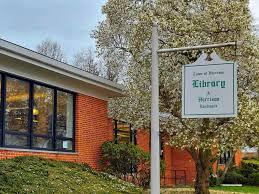
And guess what? I became an English major, earned my PhD in Literature, and became . . . a professor. And then, even better, a writer.
All because I started reading at such a young age, as a way to stay quiet at home, not to bother anyone.
Yes, it’s possible I would have ended up as a teacher and writer anyway, but who knows? And besides, I have no complaints: it’s been a really good life. Because of all that reading, without anyone telling me what I should or shouldn’t read (before puberty I was reading the steamy romances of Sidney Sheldon, the horror of Stephen King, and the literary novels of Philip Roth), I became a curious, tolerant, openminded person who knows that everyone has a story to tell and that everyone’s story deserves a compassionate listener.
And it all started at the Harrison Public Library. The place outside my home where I felt completely at home.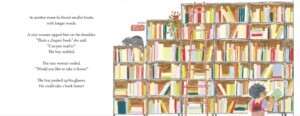
When I was old enough to walk there by myself (about a mile each way, in a very safe town), I would go there and camp out, reading for hours until I started getting hungry or until the library closed. I did that several times, walking to the library and reading for hours, before one of the librarians tapped me on the shoulder and asked if I’d like to bring a book home.
I could take a book home? Seriously?
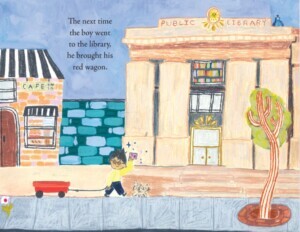 She walked me to the big desk, gave me a library card, and I took one book home that day. But the next time I came to the library, I brought my red wagon. I don’t remember how many books I put into that wagon, but as I recall, I had enough reading to last me the rest of the summer.
She walked me to the big desk, gave me a library card, and I took one book home that day. But the next time I came to the library, I brought my red wagon. I don’t remember how many books I put into that wagon, but as I recall, I had enough reading to last me the rest of the summer.
This, then, is the story of my new children’s book, The Magic Ticket. (The “magic ticket” of the story is the boy’s library card.)
It took me a long time to write it, even though it’s the essential story of my life. I guess I’ve been avoiding it, afraid of evoking such a sad moment in my family’s history. But writing it as a children’s story, using the “Once upon a time . . . . Then, one day . . .” fairy-tale structure, gave me the freedom to see my childhood as not quite the downer I sometimes remember it as. In fact, even in the midst of that sad time in my life, there was joy. And there was love. There was food to eat and friends at school and parents who loved me and a brother who was my idol.
And there were books to read. So many lives being led. So many adventures. So many stories.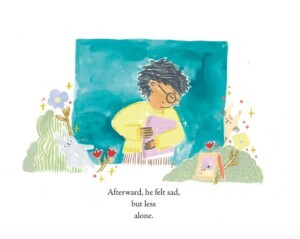
I was sad, yes. But every time I read a book, I felt less alone.
Today I saw a woman in downtown Scranton walking to the majestic Albright Library wearing a tee shirt that said, Raised by Libraries. While that’s not quite true for me–I was raised by the most loving parents a person could ask for–the Harrison Public Library certainly helped–that tee shirt, that phrase, resonated with me. I may not have been raised by libraries, but I find sanctuary there, still. And I still get that feeling, even now in my sixties, every time I walk into one–the Boulder Library in Boulder, Colorado. Centennial Park Library in Greeley, Colorado; Children’s Library in Scranton, PA; Osterhout Library in Wilkes-Barre, PA; Pack Memorial Library in Asheville, North Carolina.
Home.
[Illustrations by Kateri Kramer.]

August 22, 2024
A review of THE MAGIC TICKET from Midwest Book Review
The Magic Ticket
David Hicks, author
Kateri Kramer, illustrator
Fulcrum Publishing
www.fulcrumbooks.com
9781682754559, $16.95, PB, 32pp
Synopsis: When his beloved sister dies and his parents are too grief-stricken to attend to him, a little boy must figure out on his own how to process what has happened. When he visits his local library and a kind librarian hands him a “magic ticket”, he finds an unexpected sanctuary in the world of books. Could reading be the gateway to understanding, and coping with, such a devastating loss?
Critique: With the publication of “The Magic Ticket”, author David Hicks and illustrator Kateri Kramer have collaborated to create a tender and moving picture book story of loss, grief, and the healing power of storytelling. Especially and unreservedly recommended for children ages 3 to 9 — and for parents whose childhoods, like that of author David Hicks, was to be forever changed by the death of a loved one. This paperback edition of “The Magic Ticket” from Fulcrum Publishing is thoroughly ‘kid-friendly’ in style and subject, making it an ideal pick for family, daycare center, preschool, elementary school, and community/public library Life Skills/Life Lessons picture book collections.
The post A review of THE MAGIC TICKET from Midwest Book Review appeared first on David Hicks | Author.
“[A] tender and moving . . . story of loss, grief, and the healing power of storytelling” — a review of THE MAGIC TICKET from Midwest Book Review
Midwest Book Review, Children’s Bookwatch, August 2024
The Magic Ticket
David Hicks, author
Kateri Kramer, illustrator
Fulcrum Publishing
www.fulcrumbooks.com
9781682754559, $16.95, PB, 32pp
Synopsis: When his beloved sister dies and his parents are too grief-stricken to attend to him, a little boy must figure out on his own how to process what has happened. When he visits his local library and a kind librarian hands him a “magic ticket”, he finds an unexpected sanctuary in the world of books. Could reading be the gateway to understanding, and coping with, such a devastating loss?
Critique: With the publication of “The Magic Ticket”, author David Hicks and illustrator Kateri Kramer have collaborated to create a tender and moving picture book story of loss, grief, and the healing power of storytelling. Especially and unreservedly recommended for children ages 3 to 9 — and for parents whose childhoods, like that of author David Hicks, was to be forever changed by the death of a loved one. This paperback edition of “The Magic Ticket” from Fulcrum Publishing is thoroughly ‘kid friendly’ in style and subject, making it an ideal pick for family, daycare center, preschool, elementary school, and community/public library Life Skills/Life Lessons picture book collections.

July 22, 2024
Fiction as Truth
I’m writing this on the publication date of my children’s book, THE MAGIC TICKET (Fulcrum Books), so naturally, I’m thinking a lot about the subject of the story, my late sister Sandra. (The book is about a boy whose sister dies, after which he seeks solace in books and finds a sanctuary in his local library. The “magic ticket” of the title is his library card.) Sandra was two years my junior and probably my little buddy—what I mean is, based on what I’ve been told, along with my speculation, instincts, untrustworthy memory, understanding of myself, and knowledge of how protective and loving I was toward my second sister Marisa, who was born six years after Sandra’s death, I’m guessing that Sandra and I must have been very close. So it stands to reason that I must have been devastated when she died, suddenly, in the middle of the night, a few weeks before her second birthday, during that “bridge” period between babyhood and childhood, while I lay sleeping in the room next to hers, sick with a stomach virus.
But I don’t really know.
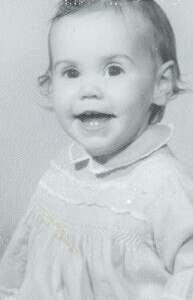 In the book, the boy wakes up to find his sister’s crib empty and when he goes downstairs he is hugged by his father, who tells him, “Your sister died”—a line that came not from my memory or reality but from a suggestion by a writing friend who intuited (correctly, as it turns out, since that kind of truth-telling has been singled out by child psychologists as much better for children than vague and confusing euphemisms like “she’s gone” or “she’s in heaven now”) that for a children’s book, I need to plug in a direct statement about what happened, instead of depicting the boy as “confused” and “lost” as I was at the time—and in reality, I don’t remember what my father or mother said to me. I doubt they said anything.
In the book, the boy wakes up to find his sister’s crib empty and when he goes downstairs he is hugged by his father, who tells him, “Your sister died”—a line that came not from my memory or reality but from a suggestion by a writing friend who intuited (correctly, as it turns out, since that kind of truth-telling has been singled out by child psychologists as much better for children than vague and confusing euphemisms like “she’s gone” or “she’s in heaven now”) that for a children’s book, I need to plug in a direct statement about what happened, instead of depicting the boy as “confused” and “lost” as I was at the time—and in reality, I don’t remember what my father or mother said to me. I doubt they said anything.
I think I remember the police running up the stairs.
I think I remember my babysitter, Janice, showing up to the house, my parents gone (to the hospital) at that point.
I think my brother and I were taken to our next-door neighbors’ house.
I think I remember the priest coming to our house days later and announcing, “You have an angel in the family!”
But I really don’t remember any of it. Years later, my mother told me that Sandra had died not of my illness but of a staph infection. Years later, 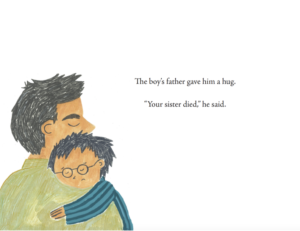 my brother, who does remember that night, kindly told me about what he saw and heard. So I don’t know if what I am picturing in my mind is something I actually remember or if they are merely images that flared up and locked in (pseudo-memory?) whenever something was described to me, so desperate was I to have some memories, any memories of that night, or of my sister, or of where I was when it happened, which nobody has ever been able to remember. My parents were understandably wrecked for months afterwards, leaving me to assume that the best thing I could do was to be quiet, to read my book (I loved The Wonderful World of Peanuts paperbacks, available for 40 cents in grocery stores back then), and not to bother my grieving parents. But that kind of confusion and isolation wouldn’t make for a very good children’s story, so I went with the clearer, more compassionate version, including the page I’m reprinting here, and I think it worked out well.
my brother, who does remember that night, kindly told me about what he saw and heard. So I don’t know if what I am picturing in my mind is something I actually remember or if they are merely images that flared up and locked in (pseudo-memory?) whenever something was described to me, so desperate was I to have some memories, any memories of that night, or of my sister, or of where I was when it happened, which nobody has ever been able to remember. My parents were understandably wrecked for months afterwards, leaving me to assume that the best thing I could do was to be quiet, to read my book (I loved The Wonderful World of Peanuts paperbacks, available for 40 cents in grocery stores back then), and not to bother my grieving parents. But that kind of confusion and isolation wouldn’t make for a very good children’s story, so I went with the clearer, more compassionate version, including the page I’m reprinting here, and I think it worked out well.
All of this is to say that I’ve found it enormously helpful to fictionalize my life story—a form of narrative therapy, I suppose. It’s so much more effective, oddly enough, than a diary or memoir or even talk therapy, because to fictionalize your story, to tell it in third person, allows you to look at yourself as a character in the story or movie of your life, and that in turn allows you to empathize with yourself –Oh my goodness, look at this poor kid, his sister died and he’s alone in his room, reading his book to the empty crib. It frees you from the usual self-blame or depression (My sister died, and I felt responsible for her death, so I felt guilty for years,) and allows you to “resolve,” through “fiction,” something that’s seemingly irresolvable—but just as true. (In other words, the story that I was a boy who was hit by a tragedy but then found solace, even happiness, through books, is just as true, if not more so, than the story that I was a sad boy who was so devastated by his sister’s death that he became a self-conscious introvert from that day forward.) It’s not fiction-as-lying or fiction-as-daydreaming; it’s fiction-as-truth. It’s structuring and crafting and staying focused on the real story rather than getting caught up in self-pity. (Not that there’s anything wrong with self-pity—it’s so much better than denying your right to your feelings in that “get over yourself” way.) Fictionalizing your self, and your life, is telling the truth, from a different perspective. The unconscious capital-T truth, which is truer than the conscious truth.
In other words, it’s fiction that is truer than non-fiction.
Another interesting moment in the book comes in the page after the death of the boy’s sister, when he goes to school the following fall. This is when the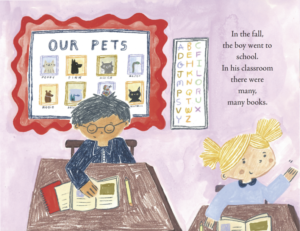 book’s illustrator, Kateri Kramer, chose to put a hint of a smile on the boy’s face as he reads from a book.
book’s illustrator, Kateri Kramer, chose to put a hint of a smile on the boy’s face as he reads from a book.
There’s no way I would have done that if I had illustrated the book. I would have depicted the boy as overwhelmingly sad, sitting in the corner, reading quietly. That’s how I remember myself. (And there was nothing in the text—“In the fall, the boy went to school. In his classroom there were many, many books”—to suggest the presence of that shy little smile to Kateri.) But here again, “fiction” is truer than fact. Truth be told, I was happy when reading, even months after my sister’s death—and it was an intensely personal, secret happiness. And that’s what that hint of a smile conveys—an inward, barely detectable joy in the act of reading. How did Kateri know to depict me as I really was, rather than how I remember I was?
I just asked her that question, and in response, she told me that by drawing that tiny smile, she was trying to indicate “the shift from sad/confused to hopeful” that occurs over the course of the book: following his sister’s death, the boy starts reading to her, just as he had done when she was alive, and in so doing, he re-connects with her. In other words, Kateri illustrated that page with the big picture of the story in mind without any input from me. And again, in crafting fiction, she hit on the Truth more accurately than if I had told her the truth according to my memory.
What’s changed, then, since the writing of this book, even more so since its publication and some public readings of it? It’s that since then, I’ve been feeling a blossoming tenderness toward my childhood self, and a newfound friendship (for lack of a better word) with my sister Sandra. Or rather, a more easeful connection with her. I’m as surprised by this as much as anything else. I mean, it’s been almost six decades since she died. While I thought the book would be difficult to read in public, the only page that makes me choke up a bit is not the one in which the father says, “Your sister died” (after all, that page is made up—I don’t remember anyone being able to explain to me what happened to her)—but the one in which the boy resolves, Someday, I will write a story about my sister. That’s when the tears spring to my eyes. Why does that last page move me so? I think it’s because it surprised me so much when I wrote it. It was, for me, a rather startling private (and now public) admission that at that young age, I wanted to be a writer.
And here’s the point: it’s not true that I thought to myself that someday I would be a writer. I would never have had such a thought at that age. But it sure as hell is True. It took me decades to realize that little boy’s fictional/truthful confession, even to state that intention out loud, to say nothing about acting on it.
But now, well, look at you, David—you’re a writer.
And what do you know, you’ve written a story about your sister!
And even though it’s the saddest story you’ve ever told, and at least a quarter of it is fictitious, you’ve written no story as true, and no story that’s made you happier.


